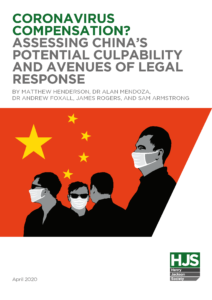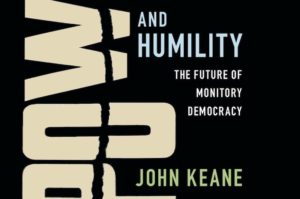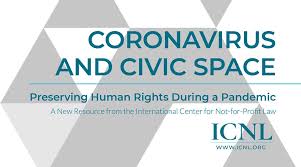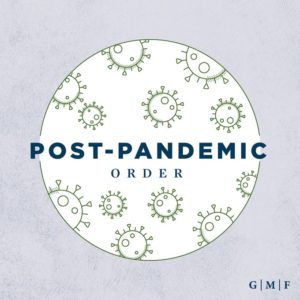 The political effects of the Covid-19 crisis are likely to be profound, Stanford political scientist Larry Diamond writes for the Atlantic Monthly:
The political effects of the Covid-19 crisis are likely to be profound, Stanford political scientist Larry Diamond writes for the Atlantic Monthly:
- In the medium to long run, the economic distress, piled atop the death toll, could destabilize and even topple many governments. That could wreak havoc on fragile democracies—or renew the case for transparency and good governance, which are hallmarks of liberal democracy.
- In the near term, the pandemic, with its need for rapid and strong government action, “provides a particularly convincing cover under which autocrats can pursue their agendas.” This cover is rapidly being exploited by autocrats around the world, from Russia to Turkey to Venezuela to Egypt; by pseudo-democrats eager to establish full dictatorship, such as Viktor Orbán of Hungary; and by democratically elected rulers—from the Philippines to India to Poland—intent on silencing free expression.
What we can see through the current fog is that four contests will define the world as it lives with and seeks to move past Covid-19, argues former UK Foreign Minister David Miliband, president and CEO of the International Rescue Committee.
These contests concern four questions: about globalisation; about democracy; about privacy; and about inequality. These are separate but linked. They each have their own narrative and content. The answers will frame the structure of new social and economic contracts that emerge around the world, he writes for the New Statesman:
 For the first time in more than a century, the world’s autocracies account for a higher share of global GDP than the world’s democracies….. Here the free world needs to make its stand – in the name of morality, but also efficiency. The point is not just that democratic government is not worth trading off for state capacity to handle crisis. It is that democratic government can help state capacity rather than reduce it. ….This contest will come down to the push and pull between the US and China, but it cannot be left to the US and China, not least because the greatest strength of the democratic world should be its alliances.
For the first time in more than a century, the world’s autocracies account for a higher share of global GDP than the world’s democracies….. Here the free world needs to make its stand – in the name of morality, but also efficiency. The point is not just that democratic government is not worth trading off for state capacity to handle crisis. It is that democratic government can help state capacity rather than reduce it. ….This contest will come down to the push and pull between the US and China, but it cannot be left to the US and China, not least because the greatest strength of the democratic world should be its alliances.
Declining satisfaction in democracy and low levels of trust in political institutions have led to increasingly polarized politics in Latin America so the political fallout from the pandemic depends on how the region’s governments countries respond, adds Nicolás Saldías (@NicSaldias), a senior researcher at the Wilson Center’s Latin American Program.
Pandemic populism?
 For the most part, Latin American democracies have survived major crises since the wave of democratization in the 1980s, he writes for the Washington Post. But the scale of this crisis is unique and may put some of the region’s democracies at serious risk of democratic backsliding.
For the most part, Latin American democracies have survived major crises since the wave of democratization in the 1980s, he writes for the Washington Post. But the scale of this crisis is unique and may put some of the region’s democracies at serious risk of democratic backsliding.
As Yelena Bonner once said, “Fear gives bad advice.” An argument is emerging not that authoritarianism bests democracy, but rather that in parlous times big government is generically superior to small or “neoliberal” government, notes analyst Adam Garfinkle. Both arguments are weak, because neither the ideological character nor the sheer size of government is ever tantamount to its strength, he writes for the Bulwark:
Other factors, like the level of social trust in a society, the competence of its governance administration, the quality of leadership, and its deep basket of cultural traits shaped by history are all more important determinants of outcomes…..It should be obvious by now that authoritarian and democratic governments can be both competent and not, precisely because they differ in their endowments of the aforementioned factors that actually make the difference between effective and ineffective response strategies.
 Moments of widespread geopolitical weakness –based on widespread socio-economic weakness– are potentially positive if they lead to a de-escalation of existing conflicts, writes for the Madrid-based Elcano Royal Institute. But they can also be dangerous if they generate political destabilisation and civil disobedience movements. Alongside the pandemic itself, the greatest danger in many societies is that of social collapse. ‘As the global economy comes apart, societies may too’, as Branko Milanovic puts it.
Moments of widespread geopolitical weakness –based on widespread socio-economic weakness– are potentially positive if they lead to a de-escalation of existing conflicts, writes for the Madrid-based Elcano Royal Institute. But they can also be dangerous if they generate political destabilisation and civil disobedience movements. Alongside the pandemic itself, the greatest danger in many societies is that of social collapse. ‘As the global economy comes apart, societies may too’, as Branko Milanovic puts it.
Authorities also continue to apply traditional means of force and cultivating fear and mistrust among citizens on the supposed grounds of fighting the pandemic, adds Elizabeth Donkervoort, Undeterred by these challenges, activists, civil society organizations (CSOs) and even the private sector in closed spaces are leveraging their skills to mobilize resources and disseminate information critical to the well-being of vulnerable communities, she writes:
Civil society groups in Nicaragua are pushing the government to implement preventative techniques, while Venezuelan CSO leaders have found creative ways to raise awareness on measures to flatten the curve and protect the most vulnerable members of society. In China and Russia, activists have developed alliances to coordinate medical supply drives and raise awareness about the virus.
We know that unregulated markets fail, but so do democracies, according to John Keane,* Professor of Politics at the University of Sydney:
 My Power and Humility (2018) shows that in the absence of public watchdog and barking dog mechanisms of democratic scrutiny and restraint, things usually go wrong in complex systems of hierarchical power. Democracy failure happens. The equation is almost mathematical: without robust accountability mechanisms, powerful state and business organisations become pea-brained. They grow unwise. Reckless delays and foolish decisions that wound the lives of citizens and spoil their environments are typically – not exceptionally – the result.
My Power and Humility (2018) shows that in the absence of public watchdog and barking dog mechanisms of democratic scrutiny and restraint, things usually go wrong in complex systems of hierarchical power. Democracy failure happens. The equation is almost mathematical: without robust accountability mechanisms, powerful state and business organisations become pea-brained. They grow unwise. Reckless delays and foolish decisions that wound the lives of citizens and spoil their environments are typically – not exceptionally – the result.
Yet, the destruction of the private sphere in the interest of the public good is precisely what theorists tell us lies at the heart of totalitarianism, adds Samuel Clowes Huneke, an assistant professor of modern German history at George Mason University. Italian philosopher Giorgio Agamben made precisely this point, arguing recently that the extraordinary response to COVID-19 is totalitarian: “The disproportionate reaction . . . is quite blatant. It is almost as if with terrorism exhausted as a cause for exceptional measures, the invention of an epidemic offered the ideal pretext for scaling them up beyond any limitation.”
 Of course, we now know the measures the Italian government introduced went neither far nor fast enough, Huneke writes for the Boston Review.
Of course, we now know the measures the Italian government introduced went neither far nor fast enough, Huneke writes for the Boston Review.
Rising nationalism means that it would be wildly optimistic to predict, even to hope, that multilateral institutions will be upgraded by great powers to better cope with future shocks, argue Karan Khemka and Parag Khanna, founder and managing partner of FutureMap and author of numerous books including Connectography and The Future Is Asian. China’s recent manipulation of the WHO and admission to the Human Rights Council, as well as the complete sidelining of the UN Security Council, suggest the United Nations will continue its terminal decay. While the IMF has temporarily restored its relevance, macroprudential supervision will fall by the wayside. The World Bank is woefully slow and underresourced, they write for Fast Company.
 Could COVID-19 reshape the world order? “Post-Pandemic Order” is GMF’s new weekly podcast covering the biggest geostrategic questions on the pandemic with hosts @Julie_C_Smith @DerekChollet @thousandfriend.
Could COVID-19 reshape the world order? “Post-Pandemic Order” is GMF’s new weekly podcast covering the biggest geostrategic questions on the pandemic with hosts @Julie_C_Smith @DerekChollet @thousandfriend.
See also the following Carnegie analyses:
- Islamic Authority and Arab States in a Time of Pandemic
- The Ripple Effects of the Coronavirus in Turkey
*This commentary has been written for IWM’s blog Coronavirus: How Will It Affect Our Lives?, and the Albert Hirschman Centre on Democracy’s series of commentaries on the effects of the novel coronavirus on democratic experiences around the globe.







